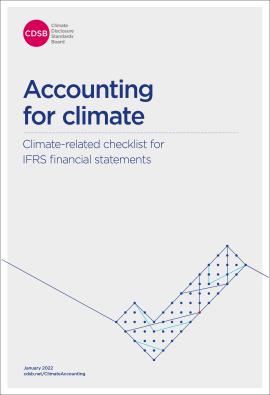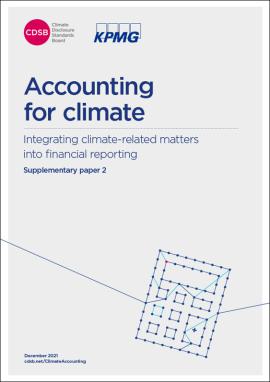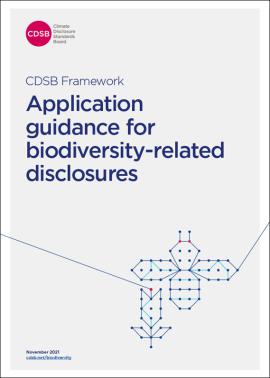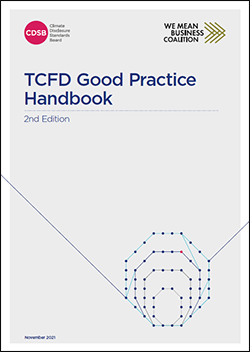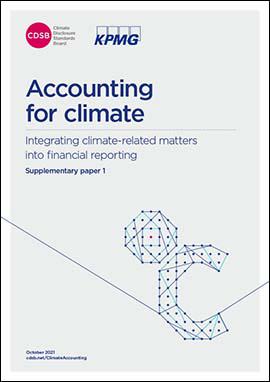| Accounting for climate: Checklist
This checklist has been produced to support preparers in identifying where climate-related matters may be relevant in the preparation and presentation of financial statements in accordance with International Financial Reporting Standard (IFRS Standards), as issued by the International Accounting Standards Board (IASB). It is intended to prompt preparers as to when climate-related matters may be relevant in relation to the accounting for and disclosure of various financial statement disclosure items. It builds on previous “Accounting for climate” papers that have been produced by CDSB and which should be referred to for more detailed guidance. |
||
Accounting for climate: Supplementary paper 2In December 2020, CDSB released guidance titled “Accounting for climate: Integrating climate-related matters into financial reporting” in order to answer three questions that are challenging preparers of financial statements: are climate-related matters relevant to financial reporting; how should climate-related matters be factored into a company’s financial reporting and what this might look like; and, what steps can companies take to integrate material climate-related matters into financial reporting? This paper provides supplemental guidance on how climate-related matters could be integrated in areas of the financial statements identified by the IASB and IFRS Foundation that were not considered in the December 2020 guidance. |
||
CDSB Framework Application guidance for biodiversity-related disclosuresThe Biodiversity Application Guidance is part of a series of CDSB Framework application guidance, which aims to extend the TCFD recommendations and its core elements to nature. It is designed to support the intended users in applying the CDSB Framework to the natural capital elements of climate change, water, and biodiversity. Following the guidance on climate-related and water-related disclosures, the Biodiversity Application Guidance is the third CDSB Framework supplementary application guidance document that is designed to enhance the quality of disclosures for such significant matters. Download in | English | French | Portuguese | Spanish |
||
TCFD Good Practice Handbook - Second Edition, 2021In collaboration with the We Mean Business Coalition, the Climate Disclosure Standards Board highlights current examples of good practice disclosure from within companies’ mainstream financial reports, which are aligned with the four core elements of the TCFD recommendations. This handbook serves as an update to the first edition of the TCFD Good Practice Handbook, co-released with the Sustainability Accounting Standards Board in 2019, and shares the practical experiences of TCFD implementation from companies, as well as provides a selection of resources that can help companies enhance their disclosure further. |
||
Accounting for climate: Supplementary paper 1In December 2020, CDSB released guidance titled “Accounting for climate: Integrating climate-related matters into financial reporting” in order to answer three questions that are challenging preparers of financial statements: are climate-related matters relevant to financial reporting; how should climate-related matters be factored into a company’s financial reporting and what this might look like; and, what steps can companies take to integrate material climate-related matters into financial reporting? This paper provides supplemental guidance on how climate-related matters could be integrated in areas of the financial statements identified by the IASB and IFRS Foundation that were not considered in the December 2020 guidance. |
||

|
CDSB Framework Application guidance for water-related disclosuresThe Water Guidance has been produced to assist companies in the disclosure of water-related financial information in the mainstream report. It is designed to supplement the CDSB Framework for reporting environmental and climate change information to investors. |
|
Accounting for climateThis guidance builds on International Accounting Standards Board’s (IASB) position on how climate-related matters should be integrated into financial reporting based on current International Financial Reporting Standards (IFRS) Standards, seeking to address the three main questions: Are climate-related matters relevant to financial reporting? How should climate-related matters be factored into a company’s financial reporting and what this might look like? What steps can companies take to integrate material climate-related matters into financial reporting? |
||
The state of EU environmental disclosure in 2020In this report CDSB has taken a deep dive into the environmental disclosures of the largest listed companies in the EU. The third in the series, we pick up where our previous report ‘Falling Short?’ left off. We compare where we were then, and what progress has been made, and will find from this comparison a clear sense of progress, which nevertheless fails to demonstrate a fast enough acceleration to achieve the change that is needed. |
||
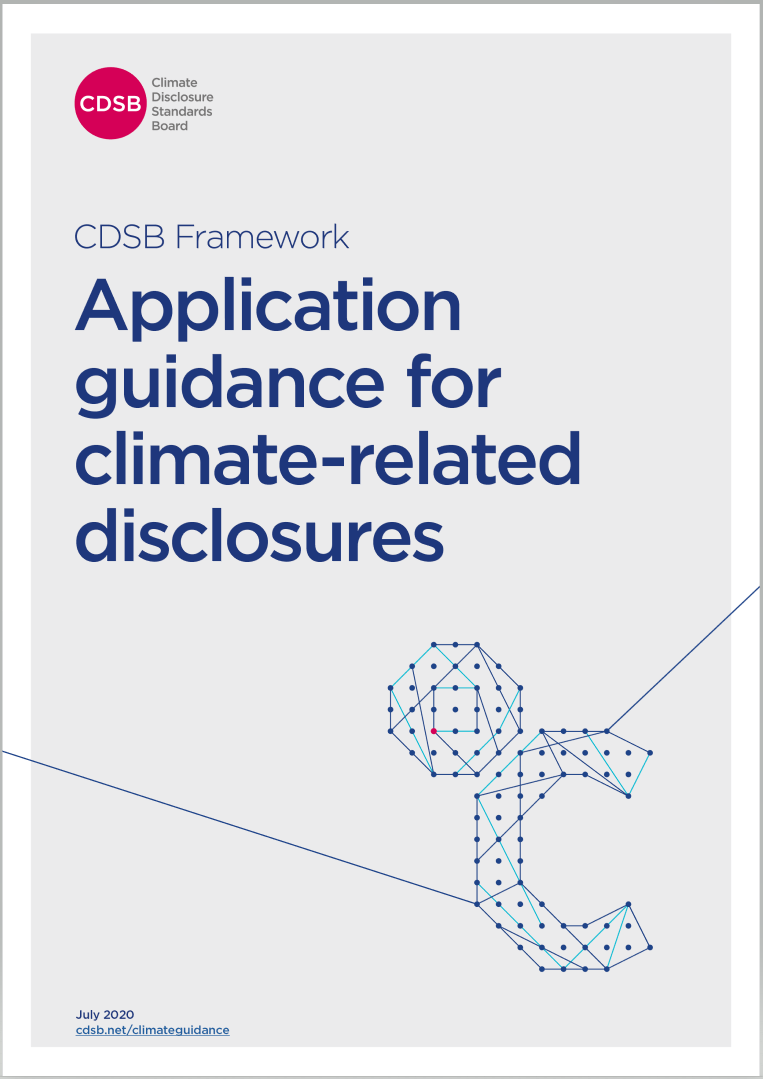
|
CDSB Framework application guidance for climate-related disclosuresThe Climate Guidance has been produced by CDSB to assist companies in the disclosure of material climate-related information in the mainstream report. |
|
Falling short?This report analyses the 2019 environmental and climate-related disclosures of Europe’s 50 largest listed companies. The purpose of this report is to inform policymakers of the changes needed to improve environmental disclosures under the Directive and to support corporate report preparers in enhancing company disclosures by identifying good practice case studies and tips. |
||
The building blocksThis paper highlights the most relevant CDP climate change questions and explains how this information can be best used for reporting in the mainstream report using CDSB’s reporting principles and requirements, clearly setting out for companies the how and what for making effective TCFD-aligned disclosures. Download in | English | Indonesian | Thai
|
||
The EU Environmental Reporting HandbookThis Handbook follows on from CDSB and CDP’s First Steps review of corporate climate and environmental disclosure under the EU Non-Financial Reporting Directive, and is an update to the EU environmental reporting handbook published in 2016. To demonstrate how companies have responded to the NFR Directive, this Handbook contains annotated examples of disclosures on environmental matters from annual reports of select European companies. |
||
TCFD Good Practice Handbook - First Edition, 2019Created by the Climate Disclosure Standards Board (CDSB) and the Sustainability Accounting Standards Board (SASB), the handbook provides real-world examples of TCFD reporting to help companies better understand how they can more effectively communicate with investors about the financially material climate-related risks and opportunities they face. Download in | English | Indonesian | Thai |
||
TCFD Implementation GuideTo accelerate the implementation of the TCFD recommendations worldwide, the Climate Disclosure Standards Board (CDSB) and the Sustainability Accounting Standards Board (SASB) have created a how to guide to enhance climate-related financial disclosures in mainstream reporting through the use of the CDSB Framework and SASB standards. Download in | English | Indonesian | Japanese |
||
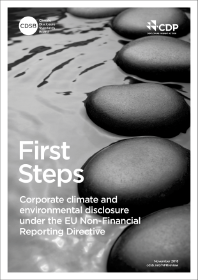 |
First Steps: Corporate climate & environmental disclosure under the EU Non-Financial Reporting DirectiveThe report focuses on the disclosure of climate change and environmental information across Europe, providing the evidence required to evaluate the state of corporate non-financial reporting. |
|
First steps on climate-related financial disclosures in EuropeA snapshot of 30 companies’ initial disclosures of climate-related risks and opportunities linked to CDSB’s First Steps report. |
||
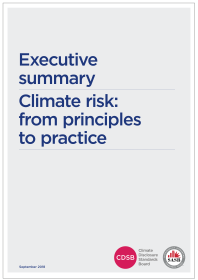 |
Executive summary - Climate risk: from principles to practiceShort summary of the technical paper produced by CDSB and SASB, focused on the alignment of the two organizations with the TCFD recommendations and additional areas of work. |
|
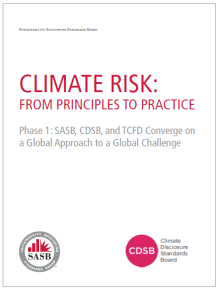 |
Climate risk: from principles to practiceWhile the TCFD recommendations and guidance are largely principles-based, the Climate Disclosure Standards Board (CDSB) and the Sustainability Accounting Standards Board (SASB) have both developed practical tools that can help organizations implement the recommendations, providing crucial information to decision makers at all levels. |
|
 |
Ready or not: are companies prepared for the TCFD recommendations?The research into 1,681 companies across 14 countries and 11 sectors disclosing to CDP looks at the four areas of disclosure identified by the Task Force on Climate-related Financial Disclosures (TCFD) – governance, strategy, risk management and metrics and targets – and highlights whether companies in specific sectors and countries are best prepared to disclose information under those themes. |
|
| Converging on Climate Risk: CDSB, the SASB, and the TCFD
CDSB and the SASB—two of the most extensively referenced organizations throughout the TCFD recommendations, across both the core elements and supporting recommended disclosures—have, over time, each developed approaches for companies to use in identifying, assessing, and reporting their performance on climate-related issues. Working together, the SASB’s metrics and CDSB’s Framework for Reporting Environmental Information and Natural Capital and Climate Change Reporting Framework (together, the CDSB Framework) complement each other to ensure a company can easily integrate climate factors into a mainstream financial filing and fulfill the recommendations of the TCFD. |
||
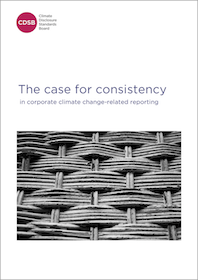 |
The case for consistency in corporate climate-change related reportingThis paper compares climate change reporting schemes, identifies common characteristics and examines challenges to consistency. View paper. |
|
 |
Making the connectionsDriving consistency sits at the core of everything we do. To help you navigate the different codes, frameworks and standards that inform corporate non-financial reporting practice, CDSB has prepared a table showing how some of the most widely used reporting approaches align with each other and with CDSB’s reporting requirements on environmental information and natural capital. |
|
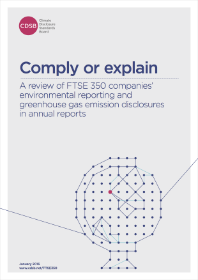 |
Comply or explain: A review of FTSE 350 companies’ environmental reporting and greenhouse gas emission disclosures in annual reportsCDSB has comprehensively reviewed the annual reports of the FTSE 350 listed companies in the report. This review discusses the disclosure of environmental information in the annual reports of FTSE350 companies following the implementation of mandatory greenhouse gas reporting in the UK (updates to the Companies Act 2006). Comply or explain focuses on comparative sector analysis and uses illustrative examples to provide evidence of current practice following the policy revision. The report proposes steps that could be taken by regulators to enhance the enabling environment for disclosure. It was reviewed by Oxford University’s Saïd Business School. View report. |
|
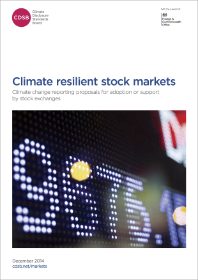 |
Climate resilient stock markets – climate change reporting proposals for adoption or support by stock exchangesThis report proposes corporate climate change reporting requirements for adoption or support by stock exchanges. It is designed to encourage the supply and use of information to strengthen the resilience of markets against climate change disruption. View report. |
|

|
Climate change – your journey to integrated reportingIntegrated and climate change-related reporting practices can both help to shape a corporation’s competitive advantage, and recognising the synergies between these practices can minimise reporting burdens on already strained corporate compliance functions. This publication therefore aims to increase awareness, deepen understanding and empower stakeholders to address the challenges posed by these new reporting practices. View publication. |
|
 |
Frequently Asked Questions on Corporate Sustainability ReportingThis document tackles the big questions around the global corporate sustainability reporting agenda by setting out the background to sustainability reporting and introducing readers to what it is, who is involved in developing it and why it is important. It provides an overview of current sustainability reporting policies and practices and focuses on the opportunities to develop corporate sustainability reporting further. View document. |
|
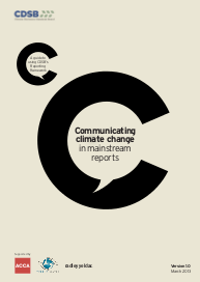 |
Communicating climate change in mainstream reportsThis document provides guidance on using the CDSB Climate Change Reporting Framework to enhance the quality of climate change disclosures in mainstream reporting – in turn making life easier for producers of reports – and increase the relevance of environmental information disclosure for the investment community. View document. |
 |
Mapping the sustainability reporting landscape: lost in the right directionACCA’s and CDSB’s new report examines the changing corporate sustainability reporting landscape, outlines its components, addresses current challenges and proposes development opportunities. It provides a considered overview of the trends, levers and drivers influencing the reporting landscape. |
|
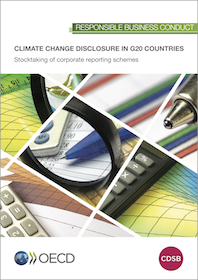 |
Climate change disclosure in G20 countries: Stocktaking of corporate reporting schemesThis OECD-CDSB report analyses mandatory reporting schemes in G20 countries and identifies commonalities and divergences between them. View report. Update: This report has been updated to inlcude progress of mandatory reporting schemes in G20 countries since COP 21. |
|
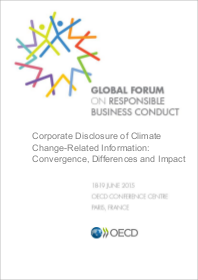 |
Corporate Disclosure of Climate Change-Related Information - Convergence, Differences and ImpactThis paper is a summary of a report by the OECD and CDSB analysing government schemes in G20 countries promoting corporate disclosure of climate-change related information. The report explores convergence and differences among these schemes, the extent and depth of information requested, the use of information by companies, investors and other stakeholders, and a preliminary assessment of the use and impacts of these schemes in changing business conduct and ultimately in contributing to governments’ climate change objectives. View paper. |
|
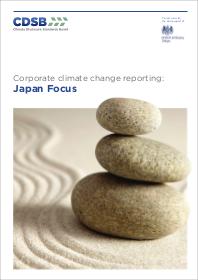 |
Corporate climate change reporting: Japan FocusThis briefing paper focuses on Japan’s corporate climate change reporting landscape and highlights important findings reflecting the need to integrate rigorous climate change-related disclosures in mainstream financial reports. View briefing paper. |
|
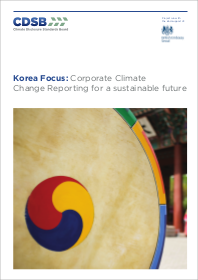 |
Korea Focus: Corporate climate change reporting for a sustainable futureThis briefing paper presents a summary of the corporate climate change reporting landscape in South Korea specifically and highlights important findings reflecting the need to integrate rigorous climate change-related disclosures in mainstream financial reports to secure a more sustainable future. View briefing paper. |
|
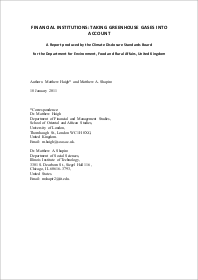 |
Financial Institutions: Taking Greenhouse Gases into Account – a report by CDSB for the Department for Environment, Food and Rural Affairs (UK)This paper makes a rigorous investigation of the ways that financial institutions in the US, Europe, Japan and Australia have applied regulatory requirements to take environmental considerations, and particularly industrial emissions of greenhouse gases, into account. Empirical evidence is provided and used to build a theory of environmental investing linking investors’ behavioural motivations, behavioural intentions and actual decisions. View paper. |
